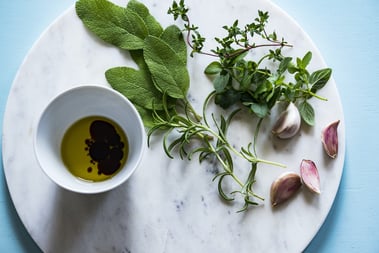The Mediterranean Diet: A Delicious Path to Health and Longevity
If you've ever sautéed spinach in olive oil and thought, “Am I healing someone right now?”, you just might be. Welcome to the deliciously research-backed world of the Mediterranean diet. It's not just about food, it’s a lifestyle, a health plan, and possibly the secret to aging like Sophia Loren.
Let’s dish out the details, Tiny Spoon style.
What Counts as Mediterranean, Anyway?
It’s more than Greece and Italy (though, shout out to their PR teams). The Mediterranean diet reflects traditional eating patterns from:
-
Southern Italy
-
Greece
-
Spain
-
Southern France
-
Turkey
-
Coastal North Africa (hello, Morocco & Tunisia!)
Basically, if it borders the Mediterranean Sea and sells olive oil by the jug, it counts.
Why it Took Off in the U.S.
The Mediterranean diet hit the American radar in the 1960s thanks to scientist Ancel Keys. He noticed folks in Greece and Italy had lower heart disease rates, even while enjoying generous amounts of olive oil, fish, and cheese. In the ‘90s, Harvard and the World Health Organization made it official with the Mediterranean Diet Pyramid—a version of the food pyramid that actually made sense.
What's on the Menu?
Think of the Mediterranean diet as the Beyoncé of food philosophies: balanced, iconic, and always in style.
Frequent Flyers:
-
Vegetables, fruits, legumes, whole grains
-
Nuts, seeds, herbs
-
Olive oil (extra virgin = VIP)
The Regulars:
-
Fish & seafood
-
Fermented dairy (Greek yogurt, cheeses)
Special Guests:
-
Poultry, eggs, and yes, red wine (in moderation)
Rarely Spotted:
-
Red meat
-
Sweets
-
Ultra-processed foods
It’s not just what you eat, but how. Mediterranean meals are shared, savored, and never rushed. Picture an al fresco lunch with loud aunts, sunshine, and laughter. Not scarfing food while doom-scrolling in front of Netflix. (Feeling called out? Us too.)
Nutritional Value
This isn’t just good food, it’s good for you!
- Reduces heart disease risk by up to 30%
- Supports brain health and memory
- Helps regulate blood sugar & maintain weight
- May reduce cancer and Alzheimer’s risk
Tiny Spoon Chef- Approved Mediterranean Meal Ideas
Ready to try it at home? Here’s how to bring those coastal vibes to your kitchen:
Olive Oil > Butter
Drizzle it, dip it, cook with it. Your arteries and your taste buds will thank you.
Prioritize Fresh & Seasonal
Tomatoes in summer, root veg in winter. Try:
-
-
Watermelon Tomato Salad with Feta & Pumpkin Seeds
-
Roasted Eggplant with Curried Yogurt & Herbed Freekeh
-
Fish Fridays & Beyond
Salmon, sardines, or sea bass 1–2x/week
Go Whole (Grains, that is)
Farro, quinoa, barley, bulgur. Favorites:
-
-
Mediterranean Quinoa Salad
-
Herb-Roasted Sea Bass with Farro & Zucchini
-
Plant-Based Stars
Chickpeas, lentils, tagines, and more. Standouts:
-
-
Apricot Almond Chickpea Tagine with Chermoula
-
Spanish Lentil Stew with Chorizo
-
Yogurt That Bites Back
Greek yogurt-based sauces and dressings:
-
-
Green Goddess Yogurt Dressing
-
Lemon-Tahini Yogurt Dip
-
Flavor with Herbs, Not Just Salt
Oregano, thyme, basil, rosemary—use generously.
And yes, wine’s allowed. But sip it like a Mediterranean local: slowly, over a meal, with people you love. (Pitcher of sangria? Not quite the same.)
Plated Wellness
The Mediterranean diet isn’t a trend, it’s a lifestyle. No calorie-counting stress, no sadness. Just meals built around balance, joy, and connection. And at Tiny Spoon Chef, we’re here to help bring that vibe to your table, whether you want chef-crafted Mediterranean menus or a little guidance on how to start.
Because good food is meant to be shared. And feta was always meant to be eaten with a fork. 😉
Curious about Mediterranean-inspired meals made just for you?
Book your consultation and let’s talk flavor, wellness, and what’s going on your plate next.
Written by Chef Mandy
.png?width=280&height=83&name=TinySpoonLogo--w-registered-trademark%20(1).png)











